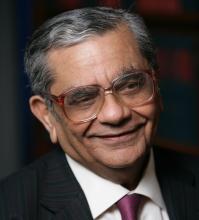Noted economist Jagdish Bhagwati on Wednesday called for realignment in the monetary policy stance adopted by the Reserve Bank and stressed on the need to shift focus on growth from the current inflation-fighting mode. "We seem to have overplayed the inflation angle and there has to be re-balancing now," he told reporters in Mumbai.
"We seem to have overplayed the inflation angle and there has to be re-balancing now," he told reporters in Mumbai.
"The growth-inflation dynamic is a perennial problem and you have to go back and forth between the two. You have to balance between the two and also go by common-sense sometimes," the Indian-American economist said.
Between March 2010 and October 2011, RBI had been solely focusing on inflation fighting through 13 rate hikes. RBI has been blaming the high fiscal deficit driven by subsidies for the sticky inflation and asked the government to offer a clear fiscal road map.
Inflation dipped a tad to 7.45 per cent in October but is still above the apex bank's comfort level.
However, more than three years of inflation fighting has not yielded the desired results though it has come down from double-digits primarily due to seasonal factors, it is still hurting everyone, especially growth.
In the October policy, RBI for the second time this year revised upwards its inflation forecast to 7.5 per cent by March-end.
But despite the Finance Minister unveiling a fiscal road map a day ahead of the last policy meet, the RBI refused to bring down interest rates.
While first quarter GDP growth slipped to a decadal low of 5.5 per cent, the latest IIP number showed a contraction of 0.4
There will be pressure on RBI from the Government to cut rates and prop up growth, especially with general elections not very far away, where it will have to establish its credentials before the voters, Bhagwati argued.
The professor of economics and law at the Columbia University, however, applauded Subbarao for standing up and preserving the independence of the central bank by not giving in to Government's wishes in the recent times. "It is a very good thing and that is a plus factor."
Bhagwati said having ushered in "track one" reforms in 1991; the Government should now focus on the "track two" reforms, which will focus on the social sector.
He said the reforms have helped in boosting growth, which has given us the resources that can now be allocated towards social welfare.
"You have to first develop the means to build resources which can then be spent," he said, citing the case of land reforms, "where we have failed to redistribute incomes even after the reforms".
Amid the debate over organic versus genetically modified crops, he stressed on the need to adopt the latter, in spite of the concerns voiced by environmentalists. "The choice is between an imaginary Frankenstein and an established way of increasing productivity."
There is also a case for bringing down tariffs, Bhagwati said, citing the highly elevated tariffs of around 12 percent in the manufacturing sector which makes Indian goods uncompetitive in the international market.










